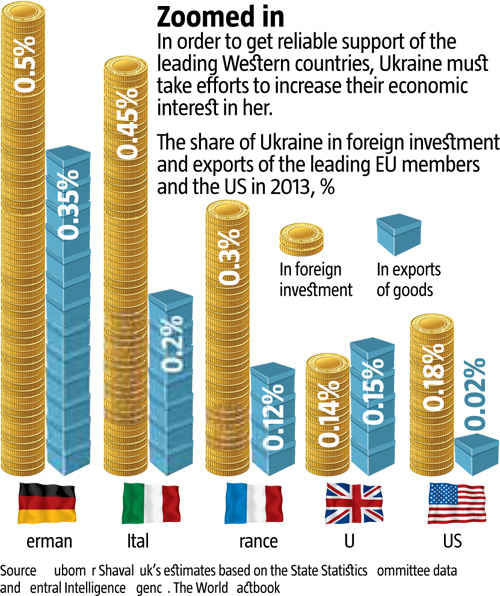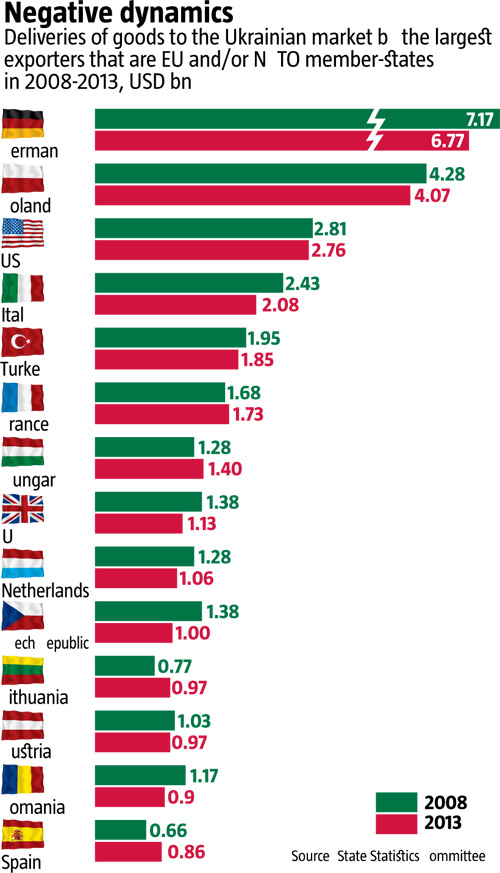Ukrainians have been complaining that the biggest Western powers are not doing enough to protect Ukraine against the Russian threat. It sometimes seems that Western countries are ready to forge any compromise with Vladimir Putin only to have the Ukrainian issue off their agenda and keep face at the same time. In some cases, they adopt a thinly disguised pro-Russian stance.
However, the obvious reasons for this status quo cannot be ignored. As long as concern for Ukraine is fueled only by the idealistic notion of common values, legal aspects (violations of international law) or the irrational motives of a geopolitical rivalry with Russia (whose relevance is dubious to many in the West), support for Kyiv will be limited, unstable and often declarative only.

In the majority of leading powers, all these aspects crash against the stern reality of a pragmatic view: the economic value of our country remains minuscule in their eyes. We are neither an important supplier of some strategic raw materials or products, nor a major sales market for their goods, nor an investment target for their key companies. Thus, the threshold of losses/expenditures they are willing to incur for the sake of keeping Ukraine in Europe’s orbit remains very low. Ukraine must think about ways to change their attitude to its security in the future.
A sales market
Ukraine’s sales market remains extremely small for the biggest Western powers. In this aspect, we lose not only to our western neighbours, but also to Russia. The EU members must now choose between relations with Russia and Ukraine. Western penetration is much lower in Ukraine than in Russia or other neighbour countries.
For example, Russian imports were merely four times bigger than Ukrainian imports in 2013 (USD 318bn and USD 77bn, respectively), but American and Dutch deliveries were nearly six times higher to Russia than to Ukraine, German 6.7 times, British and Italian seven times and Canadian and French 7.5 times higher. Leading Western states have decided to step up economic sanctions against Russia, which are hurting their trade relations, not because Ukraine is more important, but because Russia is not a priority market to most of them. For example, in 2013 Russia received a mere 3.3% of total German exports, three% of Italian, 2.3% of French, one per cent of British and American each and 0.4% of Canadian exports.
We have been even further behind our western neighbours. For example, Germany exported 7.8 times and France 5.5 times more to Poland than to Ukraine, even though Poland’s overall import volume was 2.7 higher than that of Ukraine. Turkey imported three times more than Ukraine overall but four times more of German goods. Hungary and Slovakia imported roughly as much as Ukraine did in 2013, but Germany’s share in their imports was 3.2 and 2 times bigger than in Ukraine. In general, Romania imported less than Ukraine but 1.8 more from Germany. Mexico, which lies half across the world, imported nearly twice more from Germany than Ukraine did.
Our market is more important to Polish and Romanian exporters: Russia and Ukraine account for 5.3 and 2.9% of Polish exports and 2.5 and 1.3% of Romanian exports, respectively. To Polish producers, the Ukrainian market comes close to that of Russia and such large EU states as Italy (4.3%) and France (5.6%).
 Presence of capital
Presence of capital
For a long time, direct foreign investment was viewed by Ukraine as primarily an economic matter, as a source of speeding up economic growth and modernizing the outdated structure of the economy. However, in the face of Russian aggression Ukraine is learning to look at it also as an important element of guaranteeing national security. Ukraine has neglected this potential until the last minute and large businesses from the leading Western countries have had weak penetration into the Ukrainian market.
As of early 2014, the EU states (without Cyprus) directly invested a mere US 25.4bn dollars (less than EUR 20bn) in Ukraine. This is even less than the volume of EU products sold on the Ukrainian market in 2013. These sums are negligible to the key Western powers. To compare, the total volume of foreign capital investments made by companies amounts to USD 4.85tn in the USA, USD 1.88tn in Great Britain, USD 1.87tn in Germany, USD 1.49tn in France, USD 1tn in the Netherlands, USD 0.68tn in Italy. Only a fraction of one per cent went to Ukraine.
And even these investments are largely limited to sectors with rapid capital turnover or serve merely as a cover for companies registered in European countries or in the USA by Ukrainian or Russian oligarchs and for other businesses from these countries. At the same time, Ukraine still lacks serious investments in the production sector from powerful transnational corporations from the USA, Germany, Great Britain, France and the Netherlands or adequate presence of their banking institutions. This would mean capital investments that come to stay and generate genuine interest in the future of the country to which they go.
Powerful American concerns have not dared to invest in our industry. Some of them looked closely: General Motors expressed interest in AvtoZAZ; Motorola considered making an investment in Ukraine but withdrew with a scandal. Coca-Cola remains a sole exception. Only two countries invested over USD 1bn in Ukraine as of 2014: Germany (USD 5.4bn) and the Netherlands (USD 2.3bn). However, a lion’s share of German investments (USD 4.8bn) came as a purchase of Kryvorizhstal by Mittal Steel Germany GmbH, a subsidiary of the Mittal Steel corporation. Germany invested a mere USD 112mn, Great Britain USD 84.5mn and France USD 40mn into Ukraine’s machine building industry.
That big business has not come to Ukraine from the key NATO countries in all these years is a result of intentional blocking by Russian oligarchic and other big businesses and their close Ukrainian partners. The latter cannot, for the most part, be considered national businesses, because they are closely tied in various ways to Russian companies or banks which, in their turn, are totally dependent on the Kremlin.
As a consequence, a number of sectors were stalled; Ukraine’s economy became financially dependent on Russian credit resources; cooperation with Russian producers was perpetuated with devastating effects for the efficiency of the Ukrainian economy and national security in strategically important sectors. As it declared a Western vector in its economic and political integration, Ukraine remained in the quagmire of the Russian business space and continued to be viewed through its prism by big businesses in all leading Western states.
In order to lay down the foundations for Ukraine’s real, rather than declarative, entry into the Western economic space, Ukraine needs to oust Russian business and that of pseudo-Ukrainian oligarchs who are totally dependent on cooperation with Russia’s government-owned or semi-governmental financial-industrial groups and key banks. In general, some universal solutions affecting the entire economy are needed, something along the lines of a recently adopted draft bill on the management of Ukraine’s gas transportation system: Russian companies were supplanted from a number of strategic sectors and replaced with Western companies. This is a vital and urgent measure that needs to be taken in those sectors that are usually considered key to national security: from energy to telecommunications and finances.
At the same time, if Ukraine wants Western business circles, and ultimately states, to be serious about its future, it has to do whatever large Western capital wishes in order to attract it. This capital must come in large enough volumes so that it would be forced by its own economic interests to lobby its governments to adopt an active policy on Ukraine. This policy will be genuine and truly serious only when backed up by real economic interest.
If Western businesses fail to come to Ukraine en masse, the Ukrainian market will for years remain too small for Western products due to the low purchasing power of most Ukrainians who do not have truly efficient jobs. In this situation, Ukraine will be doomed to economic degradation and loss of the ability to resist the Russian threat which will only increase, rather than subside, as long as Ukraine de facto remains in the shadow of Russia’s economic and business space. That the Association Agreement or even full-fledged EU membership cannot, on their own, stand in the way of this trend is corroborated by a number of countries that have joined the EU but continue to be easily manipulated by the Kremlin through both government and formally private capital totally dependent on its will.

